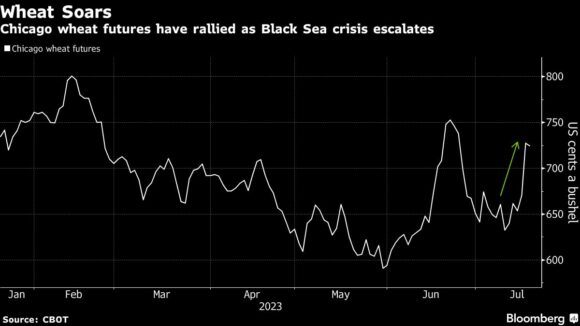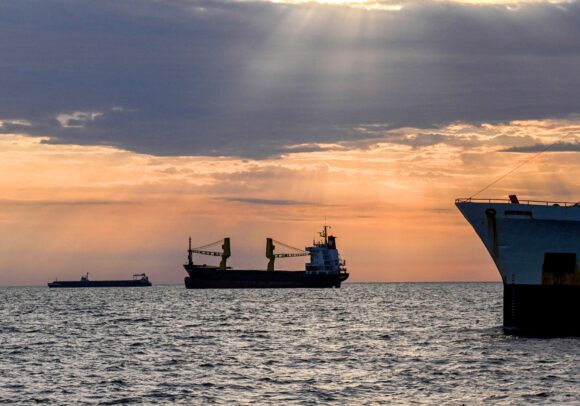Ukraine said any ships heading to Russian ports may be military targets, a tit-for-tat response to a threat from Moscow that escalates the war’s risk to global food markets.
Since Moscow halted the Black Sea agreement that allowed Ukraine to export part of its grain harvests, Russia has attacked Ukrainian grain storage facilities and warned that all vessels heading to Ukrainian ports would be considered potential carriers of military supplies.
Wheat prices surged on Wednesday, and initially jumped again when the Defense Ministry in Kyiv said any ships heading to ports in Russia and Ukrainian areas occupied by Kremlin troops were also legitimate targets. They then gave up those gains to trade little changed.
Russia Issues Warning to Any Ships Traveling to Ukraine’s Black Sea Ports
The escalating threat to vital Black Sea trade steps up the risk of turmoil on global markets for everything from oil and food staples to fertilizers. Russia’s attack on its neighbor has already severely disrupted exports from Ukraine, a major producer of grains and vegetable oils.

Ukraine has previously attacked Russian ships in the Black Sea, sinking the flagship Moskva cruiser with a Neptune anti-ship missile shortly after Russia’s invasion.
It also sank a landing ship and damaged another in the port of Berdyansk in March of 2022, and Ukrainian rockets have reached Russia’s main supply line to Crimea, the Kerch Strait bridge.
“The fate of the cruiser Moskva proves that Ukraine’s defense forces have the means necessary to repel Russian aggression at sea,” Ukraine’s Defense Ministry said.
The Black Sea is also home to a major Russian oil terminal, with more than half a million barrels a day of crude flowing through Novorossiysk, which is also a key port for fertilizer, grain and coal. Oil prices were little changed, suggesting the market took a skeptical view of the prospect of disruption.
Russia also has several export terminals for refined oil products near Taman, across from eastern Crimea. Tanker tracking data monitored by Bloomberg shows 28 oil tankers, mostly smaller products carriers, in the vicinity.
Alexander Kulikov, Chief Executive Officer at St-Petersburg based chartering company Sea Lines Ltd., said that Novorossiysk port was working as usual on Thursday. Passage through the Kerch strait has been closed since the Crimea bridge blast, and it’s unclear when it will reopen, he said. He has two ships waiting to pass the Kerch strait from the south side, he said. A spokesperson for Novorossiysk port did not immediately reply to requests for comment.
It wasn’t immediately clear how realistic the Ukrainian threat would be. Russia’s Defense Ministry also didn’t specify what it would do to any ships that try to enter Ukrainian ports.
On the other hand, Russia’s defense capabilities in the northern Black Sea and the Sea of Azov are considerable. They include a fleet of warships, including missile cruisers and radar designed to provide a protective umbrella against attack from the air, as well as the large military base on Crimea at Sevastopol.
The longest range missiles Ukraine has are Harpoons and the Storm Shadows provided by the UK. Both have maximum ranges that fall well short of Novorossiysk, as well as its approaches. That will complicate any Ukrainian efforts to strike tankers in the area.
Ukraine also has developed a small number of much less powerful long range aerial drones that may have been used in largely symbolic attacks on Moscow, in May.
Lacking a deployable navy, Kyiv has been using surface water drones in attacks on Russian naval vessels, most of which have been thwarted by cannon fire. Only naval escorts would provide such defenses for Russian merchant ships.
“They’ve shown in a number of ways they can put Russian shipping under threat in ways that surprised the Russians, so potentially they could,” said Nick Childs, senior fellow for naval forces and maritime security at the International Institute for Strategic Studies, a London think tank. “The question is whether this is part of a rhetorical slanging match, to put pressure on others to bring the grain deal back into operation, as we have seen in the past.”
The Russians may also believe, according to Childs, that the combination of overnight attacks on Ukrainian ports and grain terminals, together with threats to attack commercial shipping will be enough to create a de facto blockade, without having to actually sink any vessels.
Attacks on loaded oil tankers would also carry the risk of environmental disaster, which could trigger an unwanted backlash from the international community.
–With assistance from Áine Quinn, Alaric Nightingale, Marc Champion and Julian Lee.
Photograph: Ships in the Black Sea. Photo credit: Daniel Mihailesu/Getty Images
Topics Russia
Was this article valuable?
Here are more articles you may enjoy.



 Beazley Agrees to Zurich’s Sweetened £8 Billion Takeover Bid
Beazley Agrees to Zurich’s Sweetened £8 Billion Takeover Bid  Uber Jury Awards $8.5 Million Damages in Sexual Assault Case
Uber Jury Awards $8.5 Million Damages in Sexual Assault Case  US Appeals Court Rejects Challenge to Trump’s Efforts to Ban DEI
US Appeals Court Rejects Challenge to Trump’s Efforts to Ban DEI  Allstate CEO Wilson Takes on Affordability Issue During Earnings Call
Allstate CEO Wilson Takes on Affordability Issue During Earnings Call 

